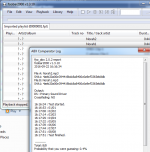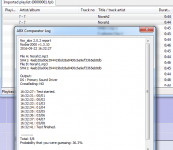Byte for byte, those files are identical.
Hmmm... I'm confused. How about this one that I used as the base file to create the other files. This is around 8dB down so it should be VERY audible. If it is also similar then later I will find out why...
Attachments
May be I'm wrong, the problem is I don't know where...
The two files (Norah1.asc and Norah2.asc) I renamed into Norah1.mp3 and Norah2.mp3 and put them into FoobarABX and here is the result...
May be I don't understand if the software is tricking me... 😡
The two files (Norah1.asc and Norah2.asc) I renamed into Norah1.mp3 and Norah2.mp3 and put them into FoobarABX and here is the result...
May be I don't understand if the software is tricking me... 😡
Attachments
Look at the clip in an editor like GoldWave - the aliasing is terrible. You're going to have to have a significant change before there is any real difference. This is the problem with digital, and specifically MP3's. This is another issue for another debate, but I specifically avoid digital control on my amplifiers, not because I can't do it, but because I don't want another digital processor in the chain. I try to keep only my source digital, and everything else analogue from there.
You'll always get it right because the files are the same.
No of course it is not (here is a proof that random select will not give 8/8). Do you think it is easy to do it? Try it! I don't believe anyone can do it. Not according to Toole/Olive...
Attachments
I converted both files to wav format using Reaper. Using WinMerge to compare, the wav files do differ, but only in the creation date time stamps in the header section. The PCM data is the same. Therefore it appears the mp3 decoder is deterministic.
If the two files sound different in Foobar, it must be making them sound different. Wouldn't be the first time software had bugs.
If the two files sound different in Foobar, it must be making them sound different. Wouldn't be the first time software had bugs.
Last edited:
This is another issue for another debate, but I specifically avoid digital control on my amplifiers, not because I can't do it, but because I don't want another digital processor in the chain. I try to keep only my source digital, and everything else analogue from there.
I have digitally controlled amps.
Quite like them because the way it is implemented means that there is less in the signal path. All checks and safety features are done digitally like if the amp should get close to overheating the computer reduces the rail voltage, should it get close to clipping it reduces gain and so forth.
The child in me likes the way the gain is faded up after switching on and the initial checks are done.
The actual signal path is as short as possible and the amps themselves are high bias Class AB.
I also like that I bought them s/h ten years ago and prices have almost tripled since then. ;-)
I could tell, but then I'd have to kill you all.
Signal embedded noise triggers/moderates system noise, good for creativity, not good for playback.
Gear signature is due to system internal noise mechanisms and consequent noise spectrums which alter envelope behavior, the elephant in the room that our ears are critically sensitive to, and this envelope sensitivity increases with age/hearing loss/experience.
These inherent system noises are signal dependent, and cause a pseudo random cloud of modulation/intermodulation products which causes masking and additionally, perceived distortions, ie system noises are not good noises.
That said, these system noises have signal dependent spectral behaviors, and can constitute the subjective signatures that separate similar measuring very low distortion gear.
This signature can be deliberately or inadvertently tailored by component choices, but this direction is just 'bending' the system complex noise behaviors.
My direction is in essentially removing signal dependent system noise behaviors and I believe I have achieved this.
The result is that just about any analogue audio device sounds 'correct', no embellishments, no reductions, just matter of fact clean, clear, detailed real sound.
Digital is a whole other subject.
Dan.
How do you differentiate between noise and signal, I though this bybee was impossible unless Maxwells Demons were invoked by a trio of Audiophiles (true believers only) dancing naked round a speaker of their choice on some hill where the lay lines meet, chanting endless mantras such as "digitises is true its not in my head" or "i trust my ears"...
that's a joke
Growing up in a family that's part Indonesia/Maluku makes one well familiar with everything out of the ordinary, my son has Java blood. (part of the caucasian side is close to nature, highly inflammable types in the middle ages. Burial text at my sister's funeral service read : The Witch has Flown)
Hearing is logarithmic, so is ∆SIL, Log 1 = 0
Lowest noticeable difference of SPL in water differs from air (I know a lot about water, submarines, and other sound S...)
It also varies with temperature and/or pressure. Your eardrums must be doing a lot of guesswork.
Last edited:
Well, I don't know what's going on there.
How about the third file I posted (Norah.asc). Is that similar too? If so, rename it into Norah.mp3 and play it through any software. You should be able to perceive the difference because it is 7.8dB down.
If the two files sound different in Foobar, it must be making them sound different. Wouldn't be the first time software had bugs.
Yes, but not "different" in a level where anyone can perceive it.
Today I downloaded Audacity so I can create a file with 0.1dB difference. I don't know if Audacity is capable of doing that. Online software can only do 0.3dB difference. I will have to learn how to use the Audacity first... I installed it in office computer (right now I'm at home).
Burial text at my sister's funeral service read : The Witch has Flown
Interesting family 🙂 I came from such neighborhood but never believed anything supranatural...
. I don't know if Audacity is capable of doing that. Online software can only do 0.3dB difference.
Reaper can do it, and the demo version is uncrippled and will run indefinitely with only a nag screen at start up. A non-commercial license is only $60, which is a bargain. Many free VST and VSTi plugins available too. And there are Windows and Mac versions. I'm not sure why people use Audacity instead, given its comparatively minimal level of development.
Last edited:
I have digitally controlled amps.
Quite like them because the way it is implemented means that there is less in the signal path. All checks and safety features are done digitally like if the amp should get close to overheating the computer reduces the rail voltage, should it get close to clipping it reduces gain and so forth.
The child in me likes the way the gain is faded up after switching on and the initial checks are done.
The actual signal path is as short as possible and the amps themselves are high bias Class AB.
I also like that I bought them s/h ten years ago and prices have almost tripled since then. ;-)
Ok, sorry, digitally controlled is great in terms of protection, etc., but I mean the input stage i.e. ADC and DAC integrated is what I want to avoid.
Overheating protection, compression and fade in/out is so easy with analogue circuits - no need for anything digital for these (except a digitally controlled potentiometer, I guess). Two things: no amp should ever overheat under any circumstance (one of my design rules), and compression (smart volume monitoring, etc.) sucks.
- Status
- Not open for further replies.
- Home
- General Interest
- Everything Else
- What is wrong with op-amps?


